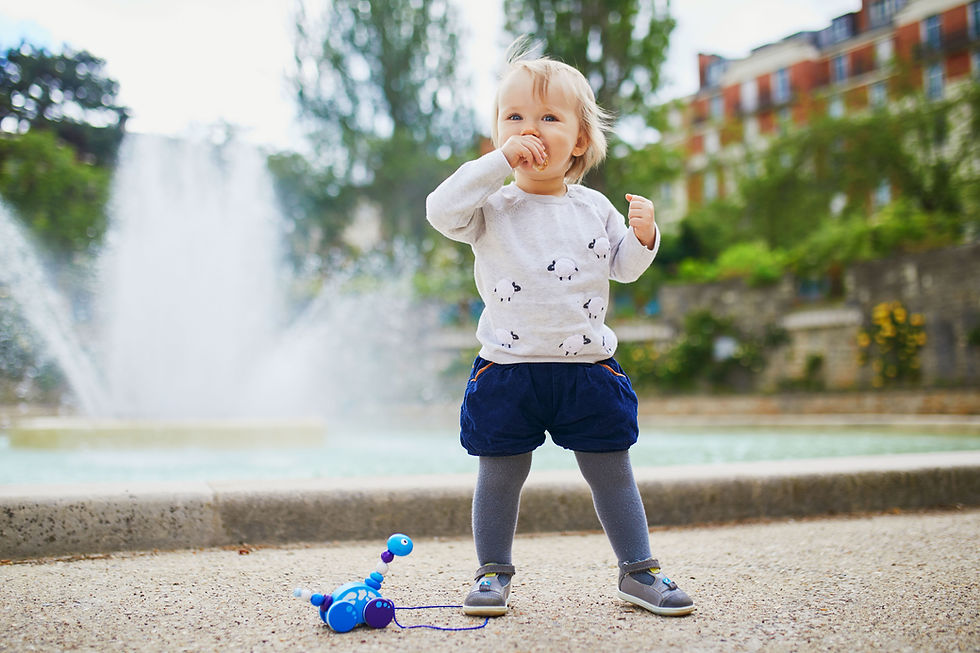Nurturing Non-Biting Behavior: Effective Strategies to Address Toddler Biting
- A Messy Classroom

- Jul 25, 2023
- 3 min read
How can I stop my toddler from biting? As a parent myself, I have had to address this very same question when picking up my daughter from grandma's only to learn she had bitten said grandma. Fear not, your child has not become a rabid animal. Biting is a common behavior exhibited by many toddlers as they navigate their early stages of development. While it can be challenging for parents and caregivers to address this behavior, it's important to approach it with patience, understanding, and effective strategies. In this blog post, we will explore practical ways to stop a toddler from biting, promoting positive social interactions and fostering their emotional growth.

Understand the Triggers:
First and foremost, it's crucial to understand the underlying reasons behind toddler biting. Toddlers may resort to biting due to frustration, teething discomfort, a desire for attention, or an inability to express their needs verbally. By identifying the triggers, you can tailor your approach and address the root cause of the behavior.
Teach Appropriate Communication:
One effective strategy is to encourage alternative forms of communication to replace biting. Teach your toddler age-appropriate words and phrases to express their emotions, needs, and frustrations. Encourage them to use their words to express themselves, and provide them with ample opportunities for verbal expression. Keep the expressions simple; "want book" or "need water" are phrases they should be able to learn quickly with enough repetition. You may also consider sign language as they tend to pick up on signs even quicker.
Model Gentle and Empathetic Behavior:
Toddlers often imitate the behavior they observe. Demonstrate gentle and empathetic behavior in your interactions with them and others. Do not pretend to bite them as they can have trouble understanding pretend play and this may teach them that biting is a way of bonding. Use positive reinforcement to praise and acknowledge their kind and gentle actions. This helps them develop a sense of empathy and understand the impact of their behavior on others.

Create a Safe and Structured Environment:
Maintaining a safe and structured environment is crucial in preventing biting incidents. Ensure that your toddler has age-appropriate toys, activities, and outlets for their energy and exploration. Encourage engaging activities that promote their social skills, such as cooperative play and turn-taking, to reduce frustration and promote positive interactions.
Provide Clear Boundaries and Consistent Discipline:
Establish clear boundaries and consistently enforce them. Communicate your expectations calmly and firmly, and use age-appropriate consequences when necessary. Redirect your toddler's behavior to more appropriate activities or offer alternative solutions when they exhibit signs of frustration or discomfort.
Encourage Positive Social Interactions:
Encourage your toddler to engage in positive social interactions with peers and siblings. Organize playdates, enroll them in supervised group activities, or participate in toddler-friendly community events. These experiences provide opportunities for socialization, sharing, and learning appropriate behavior in a group setting.

Offer Alternative Coping Strategies:
Help your toddler develop alternative coping strategies to deal with frustration or discomfort. Teach them relaxation techniques, such as deep breathing or counting to ten, to manage their emotions. Engage them in sensory activities, like playing with playdough or engaging in calming exercises, to redirect their focus and provide a healthy outlet for their emotions. Check out my blog post on creating a de-escalation zone.
Addressing biting behavior in toddlers requires patience, consistency, and understanding. By identifying triggers, teaching appropriate communication, modeling positive behavior, and creating a safe and structured environment, parents and caregivers can effectively reduce biting incidents. Remember, each child is unique, and it may take time to see progress. Through positive reinforcement, clear boundaries, and encouragement of positive social interactions, you can help your toddler develop important social-emotional skills and navigate this developmental phase successfully. With your guidance and support, your toddler will grow into a kind, empathetic, and socially adept individual.









Comments